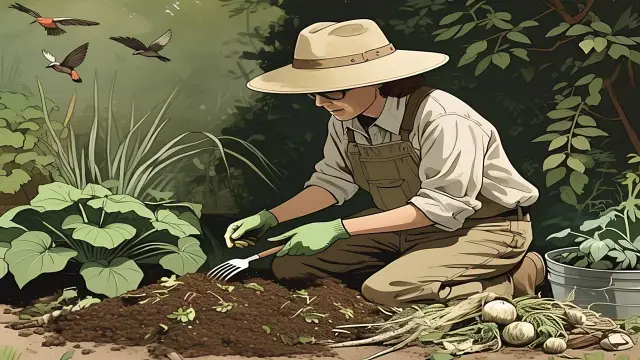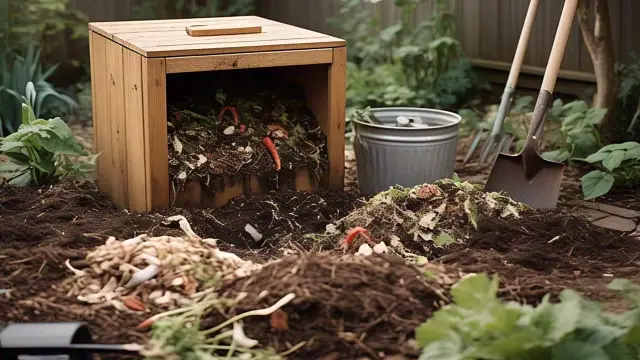Composting is a simple way to turn kitchen scraps and yard waste into nutrient-rich soil. It’s good for your garden and the planet.
If you’re new to composting, don’t worry. This guide will walk you through the basics. By the end, you’ll know how to start your own compost pile and turn waste into gold for your garden.
What is Composting?
Composting is the process of breaking down organic materials into compost. Compost is a dark, crumbly substance that enriches soil.
It’s nature’s way of recycling. Instead of sending food scraps and yard waste to landfill, you can turn them into something useful.
Why Compost?
Composting has many benefits:
- Reduces Waste: Keeps organic materials out of landfills.
- Improves Soil: Adds nutrients and improves soil structure.
- Saves Money: Reduces the need for chemical fertilisers.
- Helps the Planet: Reduces greenhouse gas emissions.
What Can You Compost?
Not all waste is suitable for composting. Here’s a quick guide:

Green Materials (Nitrogen-Rich)
- Fruit and vegetable scraps
- Coffee grounds and filters
- Grass clippings
- Fresh leaves
Brown Materials (Carbon-Rich)
- Dry leaves
- Straw or hay
- Cardboard and paper (shredded)
- Eggshells
What to Avoid
- Meat and dairy products
- Oily or greasy foods
- Pet waste
- Diseased plants
How to Start Composting
Follow these steps to create your first compost pile:
1. Choose a Location
- Pick a spot that’s easy to access.
- Ensure it has good drainage and some shade.
2. Select a Compost Bin
- Use a ready-made bin or build your own.
- Options include tumblers, bins, or open piles.
3. Layer Your Materials
- Start with a layer of brown materials for airflow.
- Add green materials, then another layer of brown.
- Aim for a 3:1 ratio of brown to green materials.
4. Maintain Your Pile
- Keep it moist, like a wrung-out sponge.
- Turn the pile every few weeks to aerate it.
- Add water if it gets too dry or brown materials if it’s too wet.
Troubleshooting Common Composting Problems
Even beginners can run into issues. Here’s how to fix them:
Smelly Compost
- Cause: Too much green material or not enough air.
- Fix: Add more brown materials and turn the pile.
Slow Decomposition
- Cause: Lack of moisture or nitrogen.
- Fix: Add water or green materials and turn the pile.
Pests in the Compost
- Cause: Food scraps like meat or dairy.
- Fix: Avoid these items and cover the pile with a lid or brown materials.
Types of Composting

There are several ways to compost. Choose the one that suits your needs:
1. Backyard Composting
- Ideal for homes with outdoor space.
- Uses a bin or open pile.
2. Vermicomposting
- Uses worms to break down waste.
- Great for small spaces like apartments.
3. Trench Composting
- Bury waste directly in the garden.
- Simple and low-maintenance.
4. Bokashi Composting
- Ferments waste using a special bran.
- Works well for meat and dairy scraps.
Tips for Successful Composting
- Chop Materials: Smaller pieces break down faster.
- Balance Greens and Browns: Aim for a mix of nitrogen and carbon.
- Turn Regularly: Aerating the pile speeds up decomposition.
- Be Patient: Composting takes time, usually a few months.
Using Your Compost
Once your compost is ready, it’s time to use it. Here’s how:
- Soil Amendment: Mix compost into garden soil to improve fertility.
- Mulch: Spread it around plants to retain moisture and suppress weeds.
- Potting Mix: Combine with soil for potted plants.
Composting Myths Debunked
Let’s clear up some common misconceptions:
Myth 1: Composting is Smelly
- Fact: A well-maintained pile should smell earthy, not foul.
Myth 2: Composting is Complicated
- Fact: It’s easy once you know the basics.
Myth 3: You Need a Big Garden
- Fact: You can compost in small spaces with the right method.
The Environmental Impact of Composting
Composting is more than just a gardening hack. It’s a way to reduce your carbon footprint.
When organic waste goes to landfill, it produces methane, a potent greenhouse gas. Composting avoids this and returns nutrients to the soil.
Final Thoughts
Composting is a simple, rewarding practice. It’s good for your garden, your wallet, and the planet.
By following this beginner’s guide, you’ll be well on your way to creating rich, nutritious compost. Start small, learn as you go, and enjoy the benefits of turning waste into something wonderful.
Have you tried composting? Share your tips and experiences in the comments below!
Summary: This beginner’s guide to composting covers everything you need to know to get started. From what to compost to troubleshooting tips, we’ve made it easy to turn your kitchen scraps and yard waste into nutrient-rich soil. Start composting today and make a positive impact on your garden and the environment.

